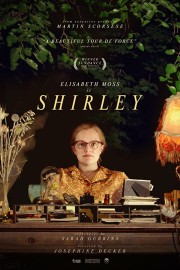Shirley
I could not help but think of Darren Aronofsky’s “mother!” while watch Josephine Decker’s “Shirley.” That is a compliment. Rather than be a straight biopic of the legendary horror author Shirley Jackson, the film Decker and screenwriter Sarah Gubbins make out of the novel by Susan Scarf Merrell make a psychological study of women married to academic men, who seem to have their pick of the litter, as well as the struggles and anxieties of dealing with creative individuals. To be sure, this film adheres to narrative structure much more than “mother!” did, but I could not help but feel some narrative trickery at work by the time the film gets to the end- can we truly believe everything that we’ve seen?
The film begins with Rose (Odessa Young) and Fred (Logan Lerman) on a train. She has been reading some of Shirley Jackson’s stories, and she gets worked up. We see them make love in the train car’s bathroom. They are going to live with the author (Elisabeth Moss) and her professor husband, Stanley Hymen (Michael Stuhlbarg), for some time while Fred gets set up as Stanley’s academic assistant at the university. Meanwhile, Rose gets roped in to taking care of Shirley at home when their maid has quit. Shirley is trying to write a new story, about a local woman’s disappearance, but she is stuck. She is also an eccentric handful for everyone. But Rose manages to connect with her, which helps as Fred finds himself immersed in university responsibilities with Stanley.
The film Decker has made feels relatively straight forward as a story for much of it- we see natural character dynamics in all of the main four characters, especially between the two couples when they are alone, even though they share time together at meals, which are usually interrupted by something either Shirley or Stanley has said that causes an abrupt departure from the dinner table. We do not necessarily doubt what we are seeing. As the film progresses to its end point, however, the narrative really becomes centered on tensions and doubts in Rose’s character, and the kinship between her and Shirley. The ending makes us feel…uncertain about the reality of what we’ve seen. It’s a sleight of hand on Decker’s part that makes us appreciate the way her and Gubbins really approach the characters on a psychological level throughout the film. There are shifting power dynamics that really hit home the closer we get to the ending, and the way those last moments play out, we feel there’s a dramatic shift again, and it’s a masterstroke on the part of the film to leave us on that note.
All four main characters give off a particular energy about them, and the actors do a great job of capturing them. Fred is ambitious and wanting to satisfy his mentor, and as the days at the college get longer, and some honest assessments of how that time is being spent start to cross our minds, we wonder how he has so much energy and lust to bring home to Rose; Lerman plays well into the character, although it’s the one with the least complexity. Stuhlbarg dives into the role of an academic who is so full of himself he has no problem condescending to his wife in his desire to see what she’s written so he can “help” or sharing his unfiltered thoughts on Fred’s dissertation at the dinner table; at the same time, though, there are moments along the way that reveal a genuine heart in the character, especially at the end, when he and Shirley are alone, at the dinner table, that gives Stuhlbarg his requisite one moment per film of real empathy. (This is not to say that he doesn’t have more than a single moment in some movies, but there’s usually at least one moment we remember more than others.) Rose and Shirley are the centerpiece roles in the film, and the performances by Young and Moss are remarkable in how they show the connection these women have with one another, and how that connection matters when their husbands almost prioritize work over them. We see the way that wears on Rose, and wonder if she will end up like Shirley, as a result. Seeing Shirley warm up to Rose, and the ways she tests that, gives Moss some fantastic moments to give the author layers and feelings we did not expect at the start of the film. The ending it builds up to is haunting, and a great insight into the emotional world of the film’s titular character, at a moment where we feel closer to her and Rose than ever. Because Shirley reveals how well she knows Rose, and how similar they truly are. You get the sense that Decker and Gubbins are the same way with their interpretation of Shirley Jackson, as well.










